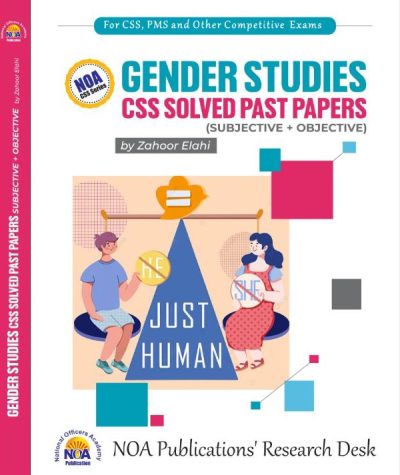Gender Studies Solved Past Papers(Subjective + Objective) By Zahoor Elahi(NOA Publication)
Best For Competitive Exams (CSS,PMS,PCS & All Descriptive Exams)
PREFACE
This wide-ranging text is made to help the students who are appearing in future CSS Competitive Examinations. This stimulating text helps in solving different subjective questions of Gender Studies asked in the past Competitive Examinations, conducted by the Federal Public Service Commission, Government of Pakistan, from CSS CE-2016 to CSS CE-2022. This scholarly writing is concerned with the social construction of gender, feminism, gender development approaches, structural adjustment programmes, governance and gender violence; expanding the debate on difference between sex and gender, women studies and gender studies and difference among WID, WAD and GAD. This broad-spectrum text evaluated and critiqued the current global mechanism and practices as well as Pakistan's legal framework protecting genders' rights with a view to strengthening women's rights and achieving gender equality in Pakistan. This extensive effort identifies the shortcomings of how Pakistan can improve genders' educational, economic, health and political equality to meet UN 2030 Agenda for Sustainable Development Goals. Furthermore, this far-reaching knowledge will also support and help students who are either pursuing their degrees in Women's and Gender Studies or appearing in other exams of gender studies: PMS exam, undergraduate exam of women's studies /gender studies. It would not have been possible to complete this book without the immense kindness, massive inspiration and exhaustive motivation of Dr. Muhammad Atif Ali, the head of the National Officers Academy. Last but not least, I would like to fully appreciate if you pinpoint further improvement via Instagram Account (zahoorelahi00) or WhatsApp number (+923004578032).
Mr. Zahoor Elahi
Author
CONTENTS
Subjective Part
Solved CSS Gender Studies Paper CE-2023
Q.2: Write a note on the status of gender studies in Pakistan. Give your reviews on the autonomy versus integration debate in gender studies.
Q.3: Differentiate between gender studies and women’s studies. Discuss in detail the multidisciplinary nature of gender studies.
Q.4: Define the terms masculinity and femininity. In your opinion where do traditional gender roles come from?
Q.5: Outline and explain the three major waves of feminist movements in the West. Discuss the influence of these waves on feminist movements in Pakistan.
Q.6: Write a detailed note on the colonial and capitalistic perspectives of gender.
Q.7: Elucidate the current health status of women in Pakistan. What measures could be taken to improve women’s status as a whole? Support your arguments with suitable examples.
Q.8: Define gender-based violence. Explain various forms of violence against women in Pakistan and devise some practical strategies which can be helpful in the eradication of gender-based violence from our society.
Solved CSS Gender Studies Paper CE-2022
Q.2: Discuss in detail the multidisciplinary nature of Gender studies.
Q.3: Describe any two Western School of thought about feminism in detail.
Q.4: Shed light on the first wave and third wave of feminism.
Q.5: According to your opinion, what are the main issue sin women as representatives in Pakistan?
Q.6: Discuss in detail Feminist movements in Pakistan.
Q.7: What are Capitalistic Perspectives of Gender? Explain.
Q.8: Discuss in detail Gender Critiqued of Structural Adjustment Policies (SAPs).
Solved CSS Gender Studies Paper CE-2023
Q.2: Write a note on the status of gender studies in Pakistan. Give your views on the autonomy versus integration debate in gender studies.
· Introduction to Status of Gender Studies in Pakistan
The field of gender studies began to emerge in Pakistani universities largely as a response to the growing women's rights movement in the country. Today, several universities in Pakistan offer degree programs in gender studies at the undergraduate and graduate levels. These programs typically focus on the social, cultural, political, and economic aspects of gender, and examine issues related to gender inequality, women's rights, and gender-based violence.
ü Background of Gender Studies in Pakistan
The development of gender studies in Pakistan is a response to the growing women's rights movement in the country, which gained momentum in the late 1970s and early 1980s. During this time, women in Pakistan were increasingly vocal in their demands for greater political and social rights, including access to education, employment, and healthcare. The development of gender studies was also influenced by broader social and political changes in Pakistan. In the 1980s, Pakistan was undergoing a period of rapid urbanization and industrialization, which brought about significant changes in social norms and gender roles. Women's participation in the workforce increased during this time, and there was a growing awareness of the need for policies and programs to address gender-based discrimination and violence. In addition, the international women's movement had a significant impact on the development of gender studies in Pakistan. The United Nations' Decade for Women, which ran from 1975 to 1985, helped to raise awareness of women's rights issues around the world, including in Pakistan.
The development of gender studies in Pakistan was also supported by the efforts of feminist scholars and activists who sought to create spaces for the study and discussion of gender issues. These scholars and activists worked to establish academic programs, research centers, and advocacy organizations focused on women's rights and gender equality.

